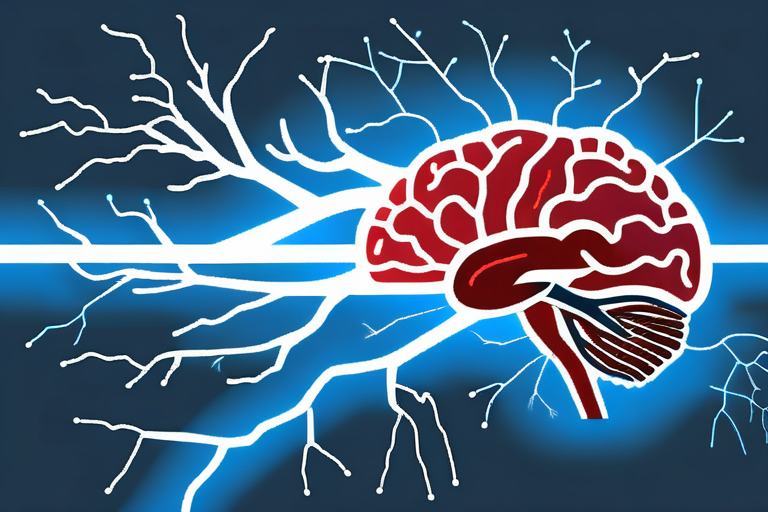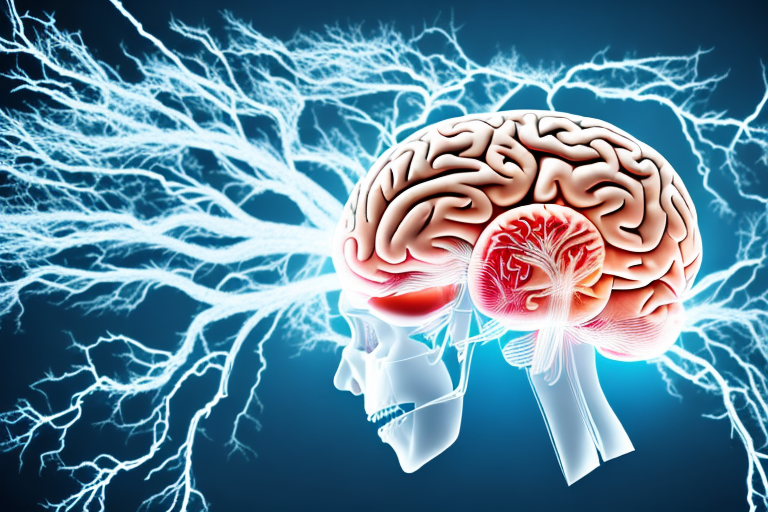Understanding the Link Between Blood Pressure and Headaches

Have you ever experienced a pounding headache that seems to come out of nowhere? You may be surprised to learn that there could be a connection between your blood pressure and those pesky headaches. Understanding this link is essential for managing your overall health and well-being. In this article, we will delve into the science behind blood pressure and headaches, explore the connection between the two, debunk common myths, and provide prevention and management strategies to keep those headaches at bay.
Defining Blood Pressure: An Overview
Before we can grasp the connection between blood pressure and headaches, let's start by understanding what blood pressure is. Blood pressure refers to the force exerted by circulating blood against the walls of your blood vessels. It consists of two measurements - systolic pressure and diastolic pressure - which are represented as two numbers (e.g., 120/80 mmHg).
When your heart beats, it pumps blood into the arteries, creating pressure within them. This pressure is what we measure as blood pressure. Systolic pressure, the top number in a blood pressure reading, represents the pressure in the arteries when the heart beats and pumps blood out. Diastolic pressure, the bottom number, indicates the pressure in the arteries when the heart is at rest between beats.
The Role of Blood Pressure in the Body
Blood pressure plays a vital role in the proper functioning of our body. It ensures that oxygen and essential nutrients are delivered to every cell, organ, and tissue. Without adequate blood pressure, our organs wouldn't receive the nourishment they need to function optimally.
Furthermore, blood pressure helps regulate body temperature and maintain the body's pH balance. It also plays a crucial role in the immune response, as white blood cells are transported through the body via the bloodstream to fight off infections and foreign invaders.
Normal vs. High Blood Pressure
When it comes to blood pressure, there is a wide range of what is considered normal. Generally, a blood pressure reading below 120/80 mmHg is considered normal. Higher readings like 140/90 mmHg could indicate hypertension, commonly known as high blood pressure. However, this depends on several factors like body size, activity, time of day pressure was measured, etc. If left uncontrolled, high blood pressure can have serious health implications, including an increased risk of cardiovascular diseases and kidney problems.
It's important to monitor your blood pressure regularly and make lifestyle changes, such as maintaining a healthy diet and exercising regularly, to keep it within a healthy range. In some cases, medication may be prescribed to help manage high blood pressure and reduce the associated risks. By understanding the importance of blood pressure and taking proactive steps to maintain it, you can safeguard your overall health and well-being.
The Science Behind Headaches
Headaches are a common ailment that most of us have experienced at some point in our lives. Understanding the science behind headaches can shed light on why they occur and how they may be related to blood pressure.

When it comes to headaches, there is a complex interplay of factors. One interesting aspect is the role of neurotransmitters in the brain. Serotonin, a neurotransmitter that helps regulate mood, sleep, and appetite, is also involved in the development of migraines. Changes in serotonin levels can trigger a cascade of events leading to the onset of a migraine attack. Additionally, the trigeminal nerve, a major pain pathway in the brain, plays a crucial role in the sensation of headache pain.
Common Types of Headaches
Headaches can be classified into various types, including tension headaches, migraines, and cluster headaches. Tension headaches are often described as a dull, aching sensation that affects both sides of the head. Migraines, on the other hand, are characterized by a throbbing pain, often accompanied by other symptoms like nausea and sensitivity to light and sound. Cluster headaches are intense headaches that occur in clusters of several weeks to months, followed by headache-free periods.
Each type of headache has its distinct characteristics and triggers. Tension headaches, for example, are often linked to muscle tension in the neck and shoulders, while migraines may be triggered by hormonal changes or certain foods. Understanding the specific features of each type of headache can help in accurate diagnosis and targeted treatment.
Triggers and Causes of Headaches
Headaches can have numerous triggers, both internal and external. Common causes include stress, lack of sleep, certain foods or drinks, hormonal changes, and environmental factors like noise and bright lights. Identifying your triggers can help you manage and prevent headaches more effectively.
In addition to these common triggers, there are also less well-known factors that can contribute to headaches. For example, weather changes, such as sudden drops in barometric pressure, have been linked to an increased risk of migraines in some individuals. Similarly, certain medications, like nitroglycerin used to treat heart conditions, can sometimes trigger headaches as a side effect. By exploring these lesser-known triggers, individuals suffering from headaches can gain a more comprehensive understanding of their condition.
Exploring the Connection Between Blood Pressure and Headaches

Now that we have a grasp on blood pressure and headaches individually, let's delve deeper into the fascinating connection between the two and explore how our body's intricate systems interact to produce these symptoms.
Understanding the relationship between blood pressure and headaches involves recognizing the complex mechanisms at play within our circulatory and nervous systems. High blood pressure, also known as hypertension, can potentially trigger headaches through a series of physiological responses. Research suggests that when blood pressure rises, it puts increased strain on the delicate blood vessels throughout the body, including those in the brain. This heightened pressure can lead to inflammation, constriction of blood vessels, and subsequent headache symptoms.
However, it is important to note that not all headaches are directly caused by high blood pressure, as various factors such as stress, dehydration, or underlying health conditions can also contribute to their occurrence. If you frequently experience severe headaches, it is crucial to consult with a healthcare professional to determine the underlying cause.
On the other end of the spectrum, low blood pressure, or hypotension, can also have an impact on headaches. When blood pressure drops too low, it can result in reduced blood flow to the brain, leading to symptoms such as headaches and dizziness. This is because the brain is not being adequately perfused.
Maintaining a delicate balance of blood pressure within the normal range is essential to support optimal brain function and overall well-being. By exploring the intricate interplay between blood pressure levels and headache symptoms, we gain valuable insights into how our body's internal processes can manifest in external signs of discomfort.
Debunking Myths: Blood Pressure and Headaches
As with any topic, myths and misconceptions often circulate. Let's debunk some of these common misconceptions about blood pressure-related headaches.
Understanding the relationship between blood pressure and headaches is crucial for maintaining overall health and well-being. While high blood pressure can indeed contribute to headaches, it is essential to recognize that various other factors can also trigger these painful symptoms. Stress, poor posture, dehydration, and even certain foods can play a role in the development of headaches, highlighting the multifaceted nature of this common ailment.
Common Misconceptions About Blood Pressure-Related Headaches
Myth: Only people with high blood pressure experience headaches. Reality: While high blood pressure can contribute to headaches, it is not the sole cause. Many other factors, such as stress and environmental triggers, can lead to headaches.
Dispelling the myth that only individuals with high blood pressure suffer from headaches is essential in promoting a more comprehensive understanding of this issue. By acknowledging the diverse array of factors that can influence headache development, individuals can take proactive steps toward prevention and management.
Facts About Blood Pressure and Headaches
Fact: Headaches can be a symptom of an underlying health condition, including high or low blood pressure. It is essential to monitor your blood pressure regularly, especially if you experience chronic headaches, and consult with a healthcare professional for proper diagnosis and management.
Recognizing headaches as potential indicators of underlying health concerns underscores the importance of holistic healthcare practices. By addressing not only the symptoms but also the root causes of headaches, individuals can work towards long-term solutions that promote overall well-being and quality of life.
Prevention and Management Strategies
To prevent and manage blood pressure-related headaches, it's crucial to adopt some lifestyle changes and explore treatment options.
When it comes to preventing and managing blood pressure-related headaches, a holistic approach is key. In addition to lifestyle changes and treatment options, understanding the underlying factors that contribute to high blood pressure and headaches can provide valuable insights into personalized care and management.
Lifestyle Changes to Control Blood Pressure

Implementing healthy lifestyle habits can significantly impact your blood pressure and reduce the likelihood of experiencing headaches. This includes maintaining a balanced diet rich in fruits, vegetables, and whole grains, engaging in regular exercise to strengthen your cardiovascular system, managing stress levels through relaxation techniques or mindfulness practices, prioritizing adequate sleep to support overall health, and avoiding excessive alcohol consumption and smoking to promote vascular health.
Furthermore, incorporating activities that promote overall well-being, such as yoga or meditation, can complement traditional approaches to blood pressure management and headache prevention.
Medication and Treatment Options for Blood Pressure and Headaches
In cases where lifestyle changes alone are not enough to manage blood pressure and headaches, medication and other treatment options may be recommended by healthcare professionals. From beta-blockers to calcium channel blockers, a variety of medications can help regulate blood pressure and alleviate associated headaches.
Moreover, alternative therapies like acupuncture, biofeedback, or massage therapy may offer additional benefits in managing blood pressure and reducing headache frequency. It's essential to work closely with your healthcare provider to explore the most effective treatment plan tailored to your individual needs.
Understanding the link between blood pressure and headaches is crucial in managing your overall health and well-being. By taking proactive steps to maintain healthy blood pressure levels and identifying your headache triggers, you can significantly reduce the frequency and severity of headaches. Remember, proper diagnosis and medical guidance play a vital role in effectively managing blood pressure-related headaches, so don't hesitate to reach out to a healthcare professional for expert advice and support.
Thanks for reading.
BestPharmaReviews.



